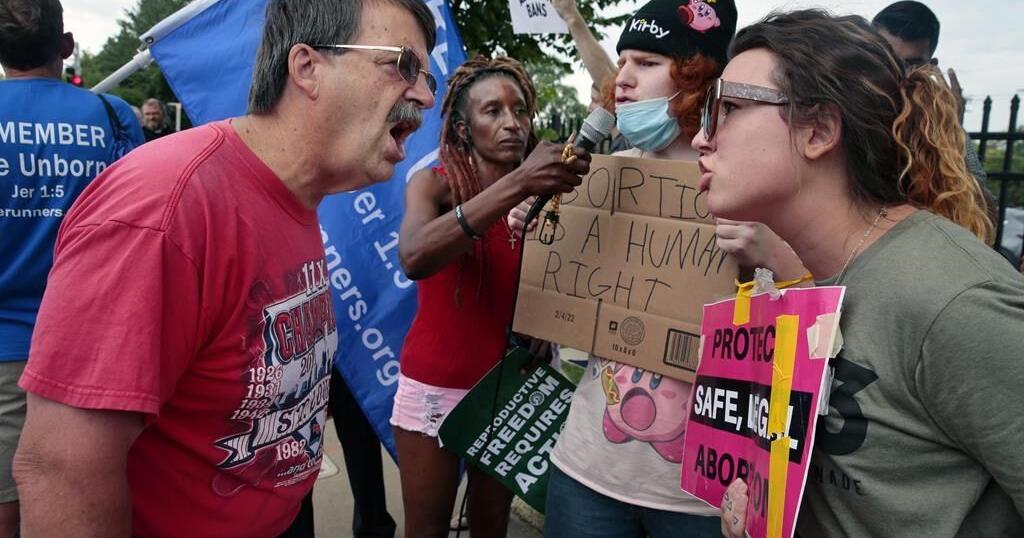CHICAGO (AP) — Billboards with the words “STOP Child Gender Surgery.” Pamphlets warning about endangering minors. “PROTECT PARENT RIGHTS” plastered on church bulletins.
As voters in nine states determine whether to enshrine abortion rights in their state constitutions, opponents are using parental rights and anti-transgender messages to try to undermine support for the ballot proposals.
The measures do not mention gender-affirming surgeries, and legal experts say changing existing parental notification and consent laws regarding abortions and gender-affirming care for minors would require court action. But anti-abortion groups hoping to end a losing streak at the ballot box have turned to the type of language many Republican candidates nationwide are using in their own campaigns as they seek to rally conservative Christian voters.
“It’s really outlandish to suggest that this amendment relates to things like gender reassignment surgery for minors,” said Matt Harris, an associate professor of political science at Park University in Parkville, Missouri, a state where abortion rights are on the ballot.
Since the U.S. Supreme Court eliminated constitutional protections for abortion, voters in seven states, including conservative Kentucky, Montana and Ohio, have either protected abortion rights or defeated attempts to curtail them.
“If you can’t win by telling the truth, you need a better argument, even if that means capitalizing on the demonization of trans children,” said Dr. Alex Dworak, a family medicine physician in Omaha, Nebraska, where anti-abortion groups are using the strategy.
Tying abortion-rights ballot initiatives to parental rights and gender-affirming is a strategy borrowed from playbooks used in Michigan and Ohio, where voters nonetheless enshrined abortion rights in the state constitutions.
Both states still require minors to get parental consent for abortions, and the new amendments have not yet impacted parental involvement or gender-affirming care laws in either state, said David Cohen, a law professor at Drexel University.
“It’s just recycling the same strategies,” Cohen said.
In addition to Missouri and Nebraska, states where voters are considering constitutional amendments this fall are Montana, Arizona, Colorado, Florida, Maryland, Nevada and South Dakota.
Missouri’s abortion ballot measure has especially become a target. The amendment would bar the government from infringing on a “person’s fundamental right to reproductive freedom.”
Gov. Mike Parson and U.S. Sen. Josh Hawley, both Republicans, have claimed the proposal would allow minors to get abortions and gender-affirming surgeries without parental involvement.
The amendment protects reproductive health services, “including but not limited to” a list of items such as prenatal care, childbirth, birth control and abortion. It does not mention gender-affirming care, but Missouri state Sen. Mary Elizabeth Coleman, a Republican and lawyer with the conservative Thomas More Society, said it’s possible that could be considered reproductive health services.
Several legal experts told The Associated Press that would require a court ruling that is improbable.
“It would be a real stretch for any court to say that anything connected with gender-affirming care counts as reproductive health care,” said Saint Louis University law and gender studies professor Marcia McCormick. She noted that examples listed as reproductive health care in the Missouri amendment are all directly related to pregnancy.
As for parental consent for minors’ abortions, she pointed to an existing state law that is written similarly to one the U.S. Supreme Court found constitutional, even before Roe v. Wade was overturned.
Most states have parental involvement laws, whether requiring parental consent or notification. Even many Democratic-leaning states with explicit protections for transgender rights require parental involvement before an abortion or gender-affirming care for minors, said Mary Ruth Ziegler, a law professor at the University of California, Davis School of Law.
A state high court would have to overturn such laws, which is highly unlikely from conservative majorities in many of the states with abortion on the ballot, experts said.
In New York, a proposed amendment to the state constitution would expand antidiscrimination protections to include ethnicity, national origin, age, disability and “sex, including sexual orientation, gender identity, gender expression, pregnancy, pregnancy outcomes, and reproductive health care and autonomy.” The constitution already bans discrimination based on race, color, creed or religion.
The measure does not mention abortion, and experts say it might be more vulnerable to opponent’s attacks.
The Coalition to Protect Kids-NY calls it the “Parent Replacement Act.” But Sasha Ahuja, campaign director for New Yorkers for Equal Rights, said the measure “does not change the existing common-sense laws that are already on the books.”
Rick Weiland, co-founder of Dakotans for Health, the group behind South Dakota ‘s proposed amendment said it uses the Roe v. Wade framework “almost word for word.”
“All you have to do is look back at what was allowed under Roe, and there were always requirements for parental involvement,” Weiland said.
Caroline Woods, spokesperson for the anti-abortion group Life Defense Fund, said the measure “means loving parents will be completely cut out of the equation.” Weiland said those claims are part of a “constant stream of misinformation” from opponents.
If this campaign strategy failed in Michigan and Ohio, why are anti-abortion groups leaning on it for the November elections?
Ziegler, the University of California, Davis law professor, said abortion-rights opponents know they may be “playing on more favorable terrain” in more conservative states like Missouri or in states like Florida that have higher thresholds for passing ballot measures.
“Anti-abortion groups are still looking for a winning recipe,” Ziegler said.
___
Associated Press writer Geoff Mulvihill in Cherry Hill, New Jersey, contributed to this report.
___
The Associated Press receives support from several private foundations to enhance its explanatory coverage of elections and democracy. See more about AP’s democracy initiative here. The AP is solely responsible for all content.
